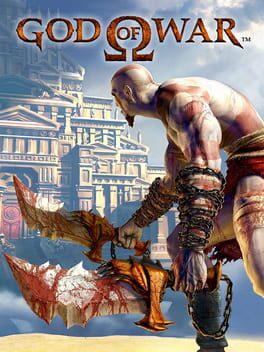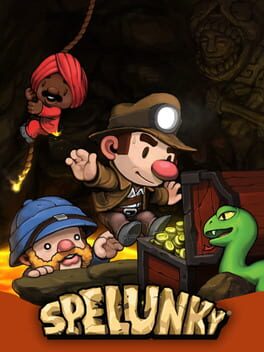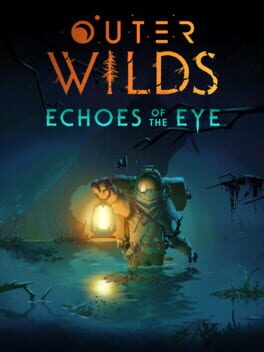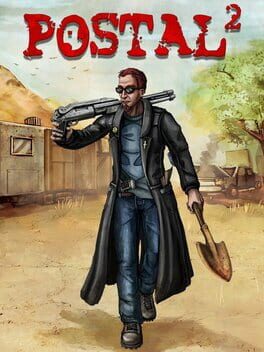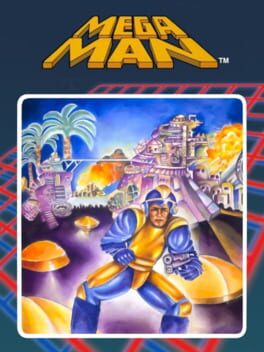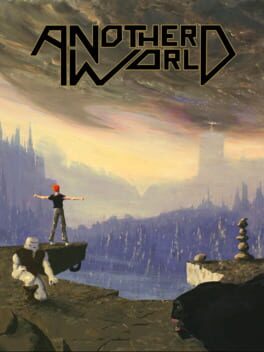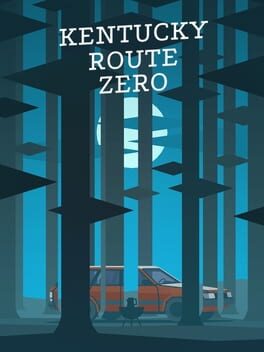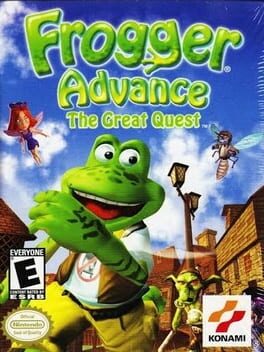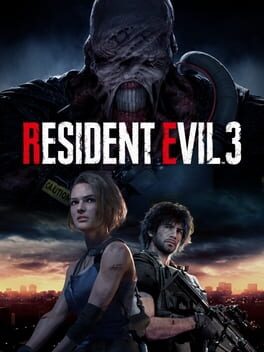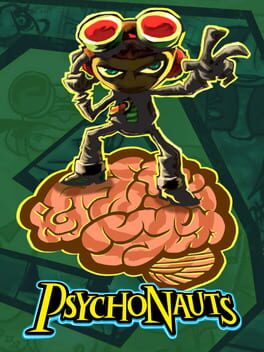jebhappy
109 Reviews liked by jebhappy
God of War
2005
Kratos' tragedy is that of dehumanizing discipline to achieve the vain glory of ultimate conquest, of fruitless strength.
I wouldn't consider God of War's drama to be particularly lucid, as it largely exists to rationalize the player's advancement in the scenarios (as is the case of so many other triple A games, to dichotomize "story" and "gameplay" in the relationship between cinematics and "the actual game", as if gameplay wasn't inherently narrative in the actions we partake in when interpreting a character) and gets too stuck for much of it in the voyage for the McGuffin that is Pandora's Box. However, I can't deny that there's something intriguing in its contradiction.
A game about the pleasure of ultra-violence and the dominance over all beings that questions our involvement in how all the expulsion of id results trivial. Merits without satisfaction, as the demonic phantasms of the past persevere. A mortal accepting the throne of a God, yet he is still condemned to be haunted by his actions; what has been done can't be borrowed, no matter how hard one fights against the divine. Kratos "wins", yet what is his worth? A solitary palace to rejoice on his emptiness? A revenge bringing no more than dissatisfaction in ostentatious dresses?
Its immediate sequels (II & III) would miss this appeal, either from the ridicule reaching an excess that it no longer can have any human grounding (this entry is absurd though, let that be clear), or from the epic centering even more scarcely in the psychological complex, making its delving to such unearned. Yet this one still holds weight in the progression of the flashbacks, each taking us closer to the painful truth, and its understanding of the Greek tragedy being personalized to the protagonist's vices; the tale functioning in pedagogical terms due to how the punishments of the Gods feature a cautionary lesson; the inevitability of the conclusion as all has been precedingly rigged (and how the flashbacks here play a role in realizing this dynamic).
Some gets lost in translation due to how troubling is to pull off its contradiction, of being satisfying while enjoying a sense of banality and transmitting it in terms of interaction with systems. Nonetheless, it remains interesting and surprisingly well designed to evade monotony in our player disposition. It takes some time to get truly engaging with the challenges, yet everything involving, for example, the three stages of the finale I found immensely gratifying in how it forces genuine attention for the enemy patterns and a pragmatic usage of our special abilities. Definitely better than the sordidness of God of War III.
I wouldn't consider God of War's drama to be particularly lucid, as it largely exists to rationalize the player's advancement in the scenarios (as is the case of so many other triple A games, to dichotomize "story" and "gameplay" in the relationship between cinematics and "the actual game", as if gameplay wasn't inherently narrative in the actions we partake in when interpreting a character) and gets too stuck for much of it in the voyage for the McGuffin that is Pandora's Box. However, I can't deny that there's something intriguing in its contradiction.
A game about the pleasure of ultra-violence and the dominance over all beings that questions our involvement in how all the expulsion of id results trivial. Merits without satisfaction, as the demonic phantasms of the past persevere. A mortal accepting the throne of a God, yet he is still condemned to be haunted by his actions; what has been done can't be borrowed, no matter how hard one fights against the divine. Kratos "wins", yet what is his worth? A solitary palace to rejoice on his emptiness? A revenge bringing no more than dissatisfaction in ostentatious dresses?
Its immediate sequels (II & III) would miss this appeal, either from the ridicule reaching an excess that it no longer can have any human grounding (this entry is absurd though, let that be clear), or from the epic centering even more scarcely in the psychological complex, making its delving to such unearned. Yet this one still holds weight in the progression of the flashbacks, each taking us closer to the painful truth, and its understanding of the Greek tragedy being personalized to the protagonist's vices; the tale functioning in pedagogical terms due to how the punishments of the Gods feature a cautionary lesson; the inevitability of the conclusion as all has been precedingly rigged (and how the flashbacks here play a role in realizing this dynamic).
Some gets lost in translation due to how troubling is to pull off its contradiction, of being satisfying while enjoying a sense of banality and transmitting it in terms of interaction with systems. Nonetheless, it remains interesting and surprisingly well designed to evade monotony in our player disposition. It takes some time to get truly engaging with the challenges, yet everything involving, for example, the three stages of the finale I found immensely gratifying in how it forces genuine attention for the enemy patterns and a pragmatic usage of our special abilities. Definitely better than the sordidness of God of War III.
You Are Jeff Bezos
2018
As someone who agrees with the point this game is bringing up, the humor tended to miss for me a lot (ah, yes, just what everyone should do: get all of their news from Twitter. That only ever made anyone a communist and didn't breed intense alt right wingers!), and it is so direct without any subtly or nuance that it you will either be like "yes, I agree with this, and?" or "please mr. bezos step all over me while i vote in another tax break". I dunno. If the humor lands for you it'll be funny but it just fell flat for me.
Spelunky
2012
Flower
2009
This is more like it. Motion controls here are far more intuitive and typical of thatgamecompany the soundtrack is lush and feels beautifully in tune with what's going on in the game. However's there has got to be a better way of incorporating a sense of progress in a game besides "light every plant up". Especially when you end up having to scour an entire area over and over again in search of that one petal buried in the fields of grass you missed. That kind of shit bogged an otherwise pleasant game down to bits along with the preachy attempts at profundity in its second half. I just wanted chill vibes. I don't need to be taught the ugliness of industry; especially when its this hammy and obvious. Thankfully with Journey the developers learned to craft these atmospheric titles without having to contain themselves to "gamey" formulas in the process.
Something I'd definitely try on VR at some point.
Something I'd definitely try on VR at some point.
Maintains the sublime terror of embodying a fragile being at the whims of an uncaring universe (and a sense of scale only achieved elsewhere by Shadow of the Colossus or Subnautica), especially in the central sequence evoking a visceral moment in Clarke’s Rendezvous with Rama.
I did find later sections incredibly opaque, as my idiot brain couldn’t parse where and when I was, let alone solve the core puzzles. Mechanics are introduced generously, but it is often unclear when and why to use them (especially compared to the stark, illuminating reveals of the main game).
Otherwise this is still the same alluring hostile universe, filled with brief moments of warmth, and one of the only games that feels this way.
I did find later sections incredibly opaque, as my idiot brain couldn’t parse where and when I was, let alone solve the core puzzles. Mechanics are introduced generously, but it is often unclear when and why to use them (especially compared to the stark, illuminating reveals of the main game).
Otherwise this is still the same alluring hostile universe, filled with brief moments of warmth, and one of the only games that feels this way.
Postal 2
2003
On September 11th, 2001, the World Trade Center in New York City was destroyed, the aftermath of which would change American culture in ways we can still pinpoint decades after the fact. The greater minutia of the War on Terror or the Bush Administration is not something I'll be delving into here, but what's important here is that specific period of time, where the tragedy was still warm on American minds and the War on Terror was just beginning, because it's that specific cultural maelstrom that gives birth to something like Postal 2.
The reason 9/11 is so important to Postal 2 is due to the fact that the transgressive nature of the game lies in its nihilistic social and political commentary about America: From offensive Muslim stereotypes modeled after Bin-Laden who violently ransack churches and yell about Allah, to a 1:1 recreation of the botched Waco Siege operation by the ATF, to a whole in-game task about getting signatures for a petition dedicated to making whiny congressmen play video games, Postal 2 is a game that could have only been made in the transitional post-9/11 period between 1997 and 2003. Yet, despite Postal 2's attempts to be an apolitical parody piece that spares no demographic or political party, there are some aspects to the parody that belie a reflection of post-9/11 American society. The Postal Dude, despite being a violent lunatic who has no qualms about violence, is a model American: He votes on Voting Day, he loves the Second Amendment, and he makes time to go to Church. The fact that the Muslim stereotypes are all part of a terrorist organization, yet reside in the heart of small-town Americana, running the grocery store and hosting their base of operations right in The Postal Dude's backyard, reflect the Islamophobia that was rampant in American culture at the time due to the 9/11 Attacks, the paranoid ignorance that led to wide-spread discrimination against Muslim-Americans. Compound this with critiques of the U.S. Government, from rampant police brutality, to a recreation of the infamous Waco Siege, to the bombing of a Muslim terrorist camp in Apocalypse Weekend by a gung-ho, hyper-violent military force in a way that reflects the worst of the War in Iraq, the post-9/11 nature of the game is prominent in it's bloodstream. It's a perfect time capsule of the era, sensibilities and all.
Following in it's predecessor's footsteps, Postal 2 aims to be transgressive, in a much more aggressive sense than the original Postal, in a way that feels like a direct, personal response to the controversy courted by Postal upon its release. One of the first missions The Postal Dude embarks on is picking up his paycheck from an in-game replica of the Running With Scissors studio, where he works and interacts with real-life staff members in-game, before the studio is besieged by moral guardians protesting against violent video games, who hypocritically, launch a violent assault the studio and its staff. The Running With Scissors office in-game is crafted with love, with photos of staff on the wall, real-world photos of documents, meticulously crafted office spaces, and a whole faction of RWS NPCs that will always support The Postal Dude and whom you are allowed to kill with zero consequence. All of this paints a meta-context for the game going forth: A direct response to RWS' critics and cultural legacy, at a time where Joe Lieberman was still in the headlines and Mortal Kombat was being presented in court hearings on violent content in video games. Where Postal was a statement, Postal 2 is a response.
The most interesting part of Postal 2 as a response piece to the criticism of Postal is the fact that it's entirely possible to complete the game without a single kill. While the original Postal was a mass-shooting simulator that required you to kill in a commentary on the casualness with which we treat violence as entertainment, Postal 2 amped up it's transgression to the surface-level with the political commentary on America, but reworked the core gameplay loop in order to put the impetus for violence on the player. While there are systems in place for all manner of violence and crass actions from a myriad of murder implements to a functioning arson and urination mechanic, there are also mechanics for the mundane: waiting in line, paying for your goals, getting arrested peacefully and non-lethal takedown methods for every enemy you encounter. The meta nature of the game is pushed further than the interaction between Postal Dude and his creators at Running With Scissors, with a complete lack of a 4th wall as the Postal Dude comments on and interacts with the player in a mostly jeering way. The game itself taunts you with tedium and annoyance in an attempt to make you go postal, holding a finger an inch from your cheek while claiming to not touch you. The violence is shifted from a requirement to complete the game to an optional way of approaching a situation, and the casualness with which the average gamer will resort to violence ties into the main underlying theme of the series: the prevalence of violence in the media.
In our entertainment, violence is the most common language with which we communicate. Even in something as innocent as Mario, you still engage in violence to reach your goals, stomping on enemies and bosses, even if the violence is abstracted enough to not feel weird over it. This is not a condemnation of violence in our media, but simply an observation. Postal was so controversial because of the fact it stripped away the layer of dissonance we create by contextualizing the violence in real-world terms: a lone gunman engaging in meaningless violence to fulfill his goals. Postal 2's commentary on violence is much less upfront than the original Postal's, but it's still interesting in the detached way in which it lets the player engage in it. If you kill or if you don't, Postal 2 passes no judgement on your actions. It knows you'll resort to violence just because it's what you're conditioned to do as someone who plays video games, but the only thing goading you into engaging in said violence is the tedium in place in our own reality. It's a horrifically offensive, ultra-violent jankfest. It's cathartic form of virtual rebellion against the mundanity of everyday life.
"POSTAL 2 is only as violent as you are."
The reason 9/11 is so important to Postal 2 is due to the fact that the transgressive nature of the game lies in its nihilistic social and political commentary about America: From offensive Muslim stereotypes modeled after Bin-Laden who violently ransack churches and yell about Allah, to a 1:1 recreation of the botched Waco Siege operation by the ATF, to a whole in-game task about getting signatures for a petition dedicated to making whiny congressmen play video games, Postal 2 is a game that could have only been made in the transitional post-9/11 period between 1997 and 2003. Yet, despite Postal 2's attempts to be an apolitical parody piece that spares no demographic or political party, there are some aspects to the parody that belie a reflection of post-9/11 American society. The Postal Dude, despite being a violent lunatic who has no qualms about violence, is a model American: He votes on Voting Day, he loves the Second Amendment, and he makes time to go to Church. The fact that the Muslim stereotypes are all part of a terrorist organization, yet reside in the heart of small-town Americana, running the grocery store and hosting their base of operations right in The Postal Dude's backyard, reflect the Islamophobia that was rampant in American culture at the time due to the 9/11 Attacks, the paranoid ignorance that led to wide-spread discrimination against Muslim-Americans. Compound this with critiques of the U.S. Government, from rampant police brutality, to a recreation of the infamous Waco Siege, to the bombing of a Muslim terrorist camp in Apocalypse Weekend by a gung-ho, hyper-violent military force in a way that reflects the worst of the War in Iraq, the post-9/11 nature of the game is prominent in it's bloodstream. It's a perfect time capsule of the era, sensibilities and all.
Following in it's predecessor's footsteps, Postal 2 aims to be transgressive, in a much more aggressive sense than the original Postal, in a way that feels like a direct, personal response to the controversy courted by Postal upon its release. One of the first missions The Postal Dude embarks on is picking up his paycheck from an in-game replica of the Running With Scissors studio, where he works and interacts with real-life staff members in-game, before the studio is besieged by moral guardians protesting against violent video games, who hypocritically, launch a violent assault the studio and its staff. The Running With Scissors office in-game is crafted with love, with photos of staff on the wall, real-world photos of documents, meticulously crafted office spaces, and a whole faction of RWS NPCs that will always support The Postal Dude and whom you are allowed to kill with zero consequence. All of this paints a meta-context for the game going forth: A direct response to RWS' critics and cultural legacy, at a time where Joe Lieberman was still in the headlines and Mortal Kombat was being presented in court hearings on violent content in video games. Where Postal was a statement, Postal 2 is a response.
The most interesting part of Postal 2 as a response piece to the criticism of Postal is the fact that it's entirely possible to complete the game without a single kill. While the original Postal was a mass-shooting simulator that required you to kill in a commentary on the casualness with which we treat violence as entertainment, Postal 2 amped up it's transgression to the surface-level with the political commentary on America, but reworked the core gameplay loop in order to put the impetus for violence on the player. While there are systems in place for all manner of violence and crass actions from a myriad of murder implements to a functioning arson and urination mechanic, there are also mechanics for the mundane: waiting in line, paying for your goals, getting arrested peacefully and non-lethal takedown methods for every enemy you encounter. The meta nature of the game is pushed further than the interaction between Postal Dude and his creators at Running With Scissors, with a complete lack of a 4th wall as the Postal Dude comments on and interacts with the player in a mostly jeering way. The game itself taunts you with tedium and annoyance in an attempt to make you go postal, holding a finger an inch from your cheek while claiming to not touch you. The violence is shifted from a requirement to complete the game to an optional way of approaching a situation, and the casualness with which the average gamer will resort to violence ties into the main underlying theme of the series: the prevalence of violence in the media.
In our entertainment, violence is the most common language with which we communicate. Even in something as innocent as Mario, you still engage in violence to reach your goals, stomping on enemies and bosses, even if the violence is abstracted enough to not feel weird over it. This is not a condemnation of violence in our media, but simply an observation. Postal was so controversial because of the fact it stripped away the layer of dissonance we create by contextualizing the violence in real-world terms: a lone gunman engaging in meaningless violence to fulfill his goals. Postal 2's commentary on violence is much less upfront than the original Postal's, but it's still interesting in the detached way in which it lets the player engage in it. If you kill or if you don't, Postal 2 passes no judgement on your actions. It knows you'll resort to violence just because it's what you're conditioned to do as someone who plays video games, but the only thing goading you into engaging in said violence is the tedium in place in our own reality. It's a horrifically offensive, ultra-violent jankfest. It's cathartic form of virtual rebellion against the mundanity of everyday life.
"POSTAL 2 is only as violent as you are."
Mega Man
1987
(In a testament to the unreliability of childhood memories, the awesome game I remember playing as a child was in fact Mega Man 2 and not the original Mega Man as I remembered.)
How does the grandpappy of the series hold up? It certainly looks and sounds good, and establishes plenty of the core mechanics as well as the charm that would go on to be a hallmark of the franchise. But (and I'll admit to being a casual scrub) it's simply too difficult to be fun. In an alternate timeline somewhere, this fades into obscurity and is picked up two decades later by the Angry Video Game Nerd who declares it "ASS" and shoots the cartridge with a cheap-CGI mega buster. The gameplay certainly bears all the hallmarks of fake difficulty dialed up to eleven, but I'm glad we avoided that timeline because this flawed game contained the seeds which sprouted into the far more refined Mega Man 2 and the superlative Mega Man X and I'll always appreciate it for that.
How does the grandpappy of the series hold up? It certainly looks and sounds good, and establishes plenty of the core mechanics as well as the charm that would go on to be a hallmark of the franchise. But (and I'll admit to being a casual scrub) it's simply too difficult to be fun. In an alternate timeline somewhere, this fades into obscurity and is picked up two decades later by the Angry Video Game Nerd who declares it "ASS" and shoots the cartridge with a cheap-CGI mega buster. The gameplay certainly bears all the hallmarks of fake difficulty dialed up to eleven, but I'm glad we avoided that timeline because this flawed game contained the seeds which sprouted into the far more refined Mega Man 2 and the superlative Mega Man X and I'll always appreciate it for that.
Another World
1991
Gameplay-wise, this is a precursor to rage games; an annoying jumble of trial-and-error and 'gotcha' moments. There are unlimited continues and numerous checkpoints, but they never quite seem like enough as you will find yourself dying again and again and again.
Its strength lies in its aesthetics and atmosphere, coming across like a precursor to games like Ico. Besides being beautifully animated and rendered, it also does an excellent job of pulling you into the story despite there not being much of a story at all. We don't know where the player-character gets Isekai'd to but it only takes a few moments and a couple of narrow escapes to know that it's not a friendly place. When you eventually meet a friendly alien in captivity, you don't know his name, why he's being held captive, or even the language he's speaking to you but you instantly feel a sense of kinship and cooperation with him. The magic of this game lies in the pure and visceral feelings it's able to evoke, and make it worth playing if you're patient (or have access to savestates).
Its strength lies in its aesthetics and atmosphere, coming across like a precursor to games like Ico. Besides being beautifully animated and rendered, it also does an excellent job of pulling you into the story despite there not being much of a story at all. We don't know where the player-character gets Isekai'd to but it only takes a few moments and a couple of narrow escapes to know that it's not a friendly place. When you eventually meet a friendly alien in captivity, you don't know his name, why he's being held captive, or even the language he's speaking to you but you instantly feel a sense of kinship and cooperation with him. The magic of this game lies in the pure and visceral feelings it's able to evoke, and make it worth playing if you're patient (or have access to savestates).
Kentucky Route Zero
2013
Interactive fiction: it's probably the most misleading title of a video game genre, since there's hardly anything at all interactive about selecting between a handful of pre-written story tracks. In most cases, you can't experience a piece of interactive fiction differently than how you can experience a piece of traditional fiction, which is a disconnect that Kentucky Route Zero does its best to fix. For its entire runtime, the game is written in a way that's difficult to not at least respect. It doesn't attempt any cheap narrative gimmicks, it doesn't become explicitly meta at any point, and, most importantly, it never gives the player the impression that any decision made will alter the story's sequence of events. A lesser piece of interactive fiction would question whether or not decisions without at least the illusion of consequence are worth including, but Kentucky Route Zero has a polar opposite philosophy.
It's no coincidence that the game seems to have a fixation on museums, because in many ways, it is one. The museum itself is only there to house the exhibits and point you towards them- what you actually get out of the exhibits is entirely up to you. Kentucky Route Zero is a collection of experiences in the same way that a museum is a collection of exhibits, and, using this line of thinking, it's clear why it was divided into an act/scene structure. It also expands this stage play notation to the dialogue, where most of the choices have the player picking lines for characters to say. This is where the game's genius lies. If the majority of other interactive fiction games can be called "reading simulators" then Kentucky Route Zero is surely a "writing simulator." You can have characters explain their backstories or display their personalities in various different ways, and the only real motivation for what choice to make is what the most appropriate next line for the story would be. Just like looking at an exhibit in a museum, it's totally up to the player how exactly each story beat is experienced, and I think a lot of people will find themselves unable to rationalize why they made certain decisions, like withholding what could've been important information to have a character comment on something trivial. Clearly, one of the game's major goals was to make the audience as much of a participant as the author, and that's where it's most successful.
I found it fascinating from a logistical standpoint for its entire duration, but in terms of its actual contents, I only really felt hooked through Act I. I get that the events are supposed to be disjointed, I get that abstraction's the point here, and maybe the game's ultimately just not for me, but I really would've liked at least some concrete plot through-lines. The mystery of the Zero itself could've served this purpose, and maybe the game could've held off on the player actual visiting it until later on in the story, but perhaps I'm just being nearsighted. It's a museum, and that's an artistic choice that I greatly admire, but maybe it's a little too content in just being a museum. Overall, it's a deeply pretentious game, in a good way. It's confident that it's an important work, one that'll resonate with its audience enough to be remembered long after its contemporaries. And I hope it's right.
It's no coincidence that the game seems to have a fixation on museums, because in many ways, it is one. The museum itself is only there to house the exhibits and point you towards them- what you actually get out of the exhibits is entirely up to you. Kentucky Route Zero is a collection of experiences in the same way that a museum is a collection of exhibits, and, using this line of thinking, it's clear why it was divided into an act/scene structure. It also expands this stage play notation to the dialogue, where most of the choices have the player picking lines for characters to say. This is where the game's genius lies. If the majority of other interactive fiction games can be called "reading simulators" then Kentucky Route Zero is surely a "writing simulator." You can have characters explain their backstories or display their personalities in various different ways, and the only real motivation for what choice to make is what the most appropriate next line for the story would be. Just like looking at an exhibit in a museum, it's totally up to the player how exactly each story beat is experienced, and I think a lot of people will find themselves unable to rationalize why they made certain decisions, like withholding what could've been important information to have a character comment on something trivial. Clearly, one of the game's major goals was to make the audience as much of a participant as the author, and that's where it's most successful.
I found it fascinating from a logistical standpoint for its entire duration, but in terms of its actual contents, I only really felt hooked through Act I. I get that the events are supposed to be disjointed, I get that abstraction's the point here, and maybe the game's ultimately just not for me, but I really would've liked at least some concrete plot through-lines. The mystery of the Zero itself could've served this purpose, and maybe the game could've held off on the player actual visiting it until later on in the story, but perhaps I'm just being nearsighted. It's a museum, and that's an artistic choice that I greatly admire, but maybe it's a little too content in just being a museum. Overall, it's a deeply pretentious game, in a good way. It's confident that it's an important work, one that'll resonate with its audience enough to be remembered long after its contemporaries. And I hope it's right.
Not a ton to say about this one, folks. It's a very very easy and very, VERY generic 2D GBA platformer. The level design evolves little throughout the game, you WILL go through the exact same swimming section at least 9 times, most of it is doing pretty simple platforming that doesn't evolve, I only died a single time before the final boss (who I died to three times against) when they SHOWER you in 1-ups. Controls are mostly fine save for the double jump having a weird delay to it that means you kinda need to pre-emptively double jump, but I DID get used to it. It isn't as horrid to control as a lot of godawful platformers and not heavily flawed, just super boring.
Normally I might be willing to give this a low 3 but maaaaaaan the art style and story suck. Did we really need Frogger to find a princess before he, ahem, busts? The spritework in this game is frequently grotesque and in the dialogue cutscenes it uses terribly pixelated versions of the already awful PS2 Great Quest models. This game is just plain disgusting to look at. Frogger has a lot better games on the GBA and the GBA has a lot better 2D Platformers, there isn't anything interesting to analyze so just...avoid this.
Normally I might be willing to give this a low 3 but maaaaaaan the art style and story suck. Did we really need Frogger to find a princess before he, ahem, busts? The spritework in this game is frequently grotesque and in the dialogue cutscenes it uses terribly pixelated versions of the already awful PS2 Great Quest models. This game is just plain disgusting to look at. Frogger has a lot better games on the GBA and the GBA has a lot better 2D Platformers, there isn't anything interesting to analyze so just...avoid this.
Resident Evil 3
2020
Compared to the smashing success of the Resident Evil 2 remake, this game got almost no positive reaction at all. Fans were upset that some of their favorite sections from the original were cut, and that no free DLC or extra modes were added for replay value. It seems like a pretty bad deal all around, but it’s less of a downgrade than it may seem. I replayed the original for a point of comparison, and found that the remake actually does a pretty good job reworking it into a smoother experience. The best example is the removal of the clock tower sequence, which is considered emblematic of a remake that cut too much. However, as memorable as the clock tower imagery is, nothing that happens there contributes to the overall plot. The area is fairly small, and it doesn’t introduce any new enemies. The question the developers had to ask was if the smoother progression of the narrative was worth the blowback from fans of the original, and they decided to take the risk. Even if they miscalculated the response, they still achieved the goal of giving Resident Evil 3 the action-movie pacing it was originally envisioned with. That’s the line that always divides fans with remakes, whether you would prefer the original flaws to be left intact, or reworked with potentially warped hindsight. However, with the remakes of Resident Evil 2 and 3 both being so fundamentally different in style from the originals that the “remake” designation is stretched to the breaking point, the latter option is easier for me to accept. I can also understand being annoyed at the lack of replayability options compared to the multiple campaigns of RE2, but the additional difficulty modes and persistent item shop did a good job of keeping me interested all the way through the ultimate inferno mode. This review is more defending the game rather than explaining why you should play it, and that’s because I understand that even the other Resident Evil fans who are most willing to replay the game found the content to be lacking. It may make it into my top games of the year, but in this case, I don’t feel like my confidence in a recommendation is proportional to my level of enjoyment. I enjoyed the RE2 remake a lot, this is essentially more of the same. How much that’s worth is up to you.
Psychonauts
2005
"If I have the gift of prophecy and can fathom all mysteries and all knowledge, and if I have a faith that can move mountains, but do not have love, I am nothing."
When I first started the journey, I wept when the grandmother recognized me for what she no longer had, but still loved. I didn't think too deeply on how much that would mean as the game continued, but I still accepted that love.
"Love is patient, love is kind."
When the feral kittens I cared for died, I wept when I found closure in saving the animals of the world of Moon. I saved every single one, not leaving a single life to chance to the "Hero". And a lot of it was waiting, patience is a virtue when it comes to understanding the lives of a world that walks on without you. Stories and people do not just come when called, they come around
to those who empathize and seek them out on their own time. And many of these moments are minor, small simple things that add on to something much bigger. Something that really encapsulates that feeling the adventure will call back to time and time again.
"But where there are prophecies, they will cease; where there are tongues, they will be stilled; where there is knowledge, it will pass away."
When I finally did what accounted as a final homecoming to areas I had been, people I had touched, I wept once more. I may not remember every single individual moment, but I'll remember what I felt towards them, and they'll live on with me.
"For now we see only a reflection as in a mirror; then we shall see face to face."
When I walked into technopolis, and so many of the earnest areas capturing the real mirrored reflections of our mundanity, I wept realizing that even in these hollowed out moments love still exists. People reflect on dystopian hells and find sorrow but there's light underneath those tunnels too. Even in its hilarious critiques of people it does not treat any of it maliciously or callously. Moon understands why we are the way we are sitting at the couch watching TV every evening.
"But the greatest of these is love."
When the game asked me to open the door, the one that mattered. With love in my heart, I went through.
(From the words of 1 Corinthians 13, thank you to a friend who showed a brighter way to see life. I hope you found love too!)
When I first started the journey, I wept when the grandmother recognized me for what she no longer had, but still loved. I didn't think too deeply on how much that would mean as the game continued, but I still accepted that love.
"Love is patient, love is kind."
When the feral kittens I cared for died, I wept when I found closure in saving the animals of the world of Moon. I saved every single one, not leaving a single life to chance to the "Hero". And a lot of it was waiting, patience is a virtue when it comes to understanding the lives of a world that walks on without you. Stories and people do not just come when called, they come around
to those who empathize and seek them out on their own time. And many of these moments are minor, small simple things that add on to something much bigger. Something that really encapsulates that feeling the adventure will call back to time and time again.
"But where there are prophecies, they will cease; where there are tongues, they will be stilled; where there is knowledge, it will pass away."
When I finally did what accounted as a final homecoming to areas I had been, people I had touched, I wept once more. I may not remember every single individual moment, but I'll remember what I felt towards them, and they'll live on with me.
"For now we see only a reflection as in a mirror; then we shall see face to face."
When I walked into technopolis, and so many of the earnest areas capturing the real mirrored reflections of our mundanity, I wept realizing that even in these hollowed out moments love still exists. People reflect on dystopian hells and find sorrow but there's light underneath those tunnels too. Even in its hilarious critiques of people it does not treat any of it maliciously or callously. Moon understands why we are the way we are sitting at the couch watching TV every evening.
"But the greatest of these is love."
When the game asked me to open the door, the one that mattered. With love in my heart, I went through.
(From the words of 1 Corinthians 13, thank you to a friend who showed a brighter way to see life. I hope you found love too!)
Super Metroid
1994
Super Metroid is built on a foundation of dread. Clever foreshadowing of future events and callbacks to the original game set the stage for Samus Aran's most dangerous adventure yet. From the very beginning, you can see the layers in the world you will be peeling back out of that sense of adventure and throughout its entire runtime, Super Metroid not only never disappoints, but it constantly proves its ability to create an engaging adventure as a genre-defining masterpiece.
The world is expertly designed, with foreshadowing and temporarily inaccessible pathways that lead to new abilities. These abilities grant even more possibilities to the player for exploration and combat. The dread created with the seemingly abandoned environemt is elevated as you slowly but surely realize you are not alone in Planet Zebes. This atmosphere is created with the amazing art-direction, music and sound that fits the setting perfectly.
The exploration is top notch, every single location bleeds into the other with movement so fluid that every single jump and move feels natural and an overall tool that can enhance and reward a skilled player's experience. It treats you and challenges you as an intelligent player with so little flaws that it genuinely feels like this game could have come out this year.
Overall, Super Metroid is a turning point not only for the series, but for adventure games overall. This genre defining masterpiece has aged like a fine wine over the past 27 years and has single-handedly proven to me how far the potential for this series can go.
The world is expertly designed, with foreshadowing and temporarily inaccessible pathways that lead to new abilities. These abilities grant even more possibilities to the player for exploration and combat. The dread created with the seemingly abandoned environemt is elevated as you slowly but surely realize you are not alone in Planet Zebes. This atmosphere is created with the amazing art-direction, music and sound that fits the setting perfectly.
The exploration is top notch, every single location bleeds into the other with movement so fluid that every single jump and move feels natural and an overall tool that can enhance and reward a skilled player's experience. It treats you and challenges you as an intelligent player with so little flaws that it genuinely feels like this game could have come out this year.
Overall, Super Metroid is a turning point not only for the series, but for adventure games overall. This genre defining masterpiece has aged like a fine wine over the past 27 years and has single-handedly proven to me how far the potential for this series can go.
Psychonauts
2005
Smartly written and endlessly charming, Psychonauts is an ambitious action-platformer that never plays the same for more than a minute. Such strikingly diverse level design and gameplay would be an immediate criticism of any game other than this joyous excursion into psychological chaos. The madness works on the basis of its premise of the hero jumping into people's troubled minds to help them overcome traumas (Inception, anyone?). Silly as that may sound, the abundance of quirky characters brim with personality and really bring the experience to life. There are no doubt high and less-high points in a game as freewheeling as this, the peak being the surreal, funny and rather Lynchian level known as the Milkman Conspiracy. You'll just have to play it.
